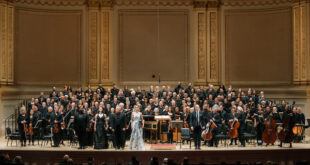Does death inspire more artistic creativity than anything else does? A case might be made. Maybe it’s a coincidence, but my last two theatrical experiences were Dead + Alive — a comic clown show full of juggling and goofy music that centers on a reanimated clown corpse — and Where Are You? (New York), which dealt with the many ways we deal with the loss of a loved one. Meanwhile, I’m listening to the violin concerto “Beautiful Passing,” which was inspired by a death, or more precisely, a dying. It’s one of the two major works by Grammy-winning composer and guitarist Steven Mackey on the new album by that name.
Many contemporary composers continue the modernist tradition of asking soloists to master unconventional techniques to draw unexpected sounds from traditional instruments. But with “Beautiful Passing,” violinist Anthony Marwood performs a more impressive feat: articulating a new language with (mostly) well-established timbres and techniques.

Inspired by a “beautiful passing”
Mackey develops that language not through tension and release but by flights and tunnelings that clash and converse. In his liner notes he explains that the 24-minute opus, which premiered in 2008, derived from three states of being he observed and experienced as his mother died: her strength and serenity; busy hospital noise and activity; and his own zoned-out sleeplessness. The music is not programmatic, but reflects those experiences.
In the opening minutes, blaring alarums interrupt flowing violin melodies. Harmony is restored for a time and the soloist gains momentum, but undercurrents of percussive tension persist. A third of the way in, the violin part flowers into a fluttery high register; the blaring horn theme makes a last stand before the violin’s virtuosity sails into an inspired cadenza. Folk fiddle flavors carry the piece into an eventual calm.
But the of the album is Mnemosyne’s Pool, a five-part “symphonic saga” that speaks of memory from a variety of angles. Composed again in Mackey’s distinctive lexicon, it says things we all know in our musical minds but have never heard articulated in this way. Sleeping giants awaken; wisps of recall slip away; retired characters return in cameo appearances.
A major symphonic achievement
Vivid colors emerge from all corners of the orchestra, a fine performance by the Sydney Symphony conducted by David Robertson. (Gustavo Dudamel and the Los Angeles Philharmonic premiered it in 2015.) Bells toll and evolve into a rhythmic pounding in the opening movement, “Variations.” Dissonant stabs form a hypnotic melody that’s echoed in a quieter episode marked by rippling accents and ghostly atmospherics. When the dissonances return they’re accompanied by horns trumpeting like elephants.
Melodic lines in the “Déjà Vu (Medley)” movement create in the listener’s mind regularities that aren’t necessarily there, even as a not-quite-regular alternation, like a left-hand piano accompaniment to an old-time popular song, persists at a lower sonic layer. Romance-tinged melodies and jazzy interjections keep one guessing and, in my case, consistently intrigued.
A whistling oboe introduces a playful scherzo-like movement called “Fleeting” that suggests elusive hints of memory, first wispy, then insistent. The lower strings quietly thrum a dirge in the “In Memoriam A.H.” movement, which commemorates the composer’s father-in-law. The winds take up the mournful theme; plucked strings echo the ripples of the opening movement; bells toll.
Themes and gestures bounce about as if between canyon walls in the cinematic final movement, called “Echoes.” Echoes of the earlier movements slide in unannounced. The pianist bangs the keyboard; chaos threatens, but there’s always method in the madness. A quiet, trio-like section recalls the romance of the second movement. A brassy fanfare builds into a massively mutated tolling of “bells” from the entire orchestra in deathly 6/4 time, an onslaught of music-muscle.
Like a Beethoven symphony, Mnemosyne’s Pool is a massive construction in an original language and repays multiple listens. Both it and “Beautiful Passing” are major additions to the contemporary literature. The album is available now on major streaming platforms.
 Blogcritics The critical lens on today's culture & entertainment
Blogcritics The critical lens on today's culture & entertainment




